Umer Ali
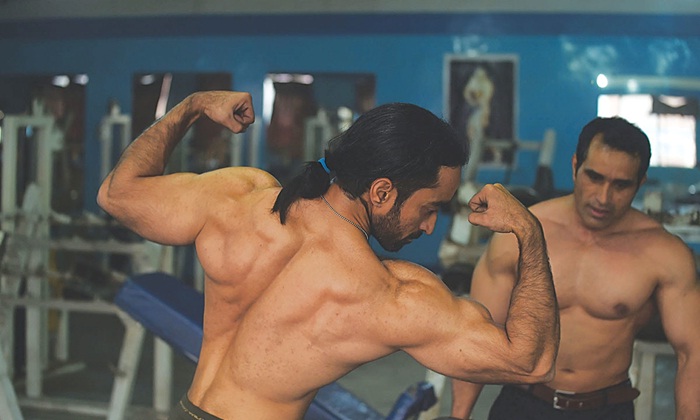
M Arif, White Star
Rangpura is caught between its urban aspirations and rural roots. A shiny shopping mall stands along its main road while a stable for horses sits just off it. Houses adjacent to each other offer a sharp contrast — if one has a portico, a balcony and a high boundary, the other has a vast courtyard in front of a row of rooms built behind a veranda.
Rangpura is located on the southeastern flank of a flyover that connects Sialkot city in the south with Saddar, the civilian residential part of the local garrison, in the north. Nestled in one of its narrow streets, World Gym is a major local attraction.
Frequented by men and women of all ages, the gym stands right next to a cattle farm. On a recent November day, a huge panaflex poster covers half of its main wall and greets the local populace for (the recently celebrated) Eid.
The gym has a cramped low-ceiling hall and rusty equipment. Pictures and posters of various sizes adorn the walls inside. A heavily built man with a relatively small face shows his muscles in most of them. These are photos of Hamid Ali, known locally as Ustad Gujju, who set up the gym about two decades ago.
On April 3, 2016, Gujju died. He was only 41 years old.
Gujju has left behind three young daughters, his widow and a mother who is unable to recover from the shock even months after her son’s untimely death.
Accounts of how he died vary.
His brother Rizwan Ali says Gujju rode his own motorcycle from Lahore to Sialkot on the day of his death after participating in a bodybuilding competition – a South Asia championship – in which he came second. He looked totally fine when he arrived home, says Rizwan Ali, 31, who runs a livestock farm in Rangpura. “He visited his mother that night and the two had a long conversation.”
While he was still with his mother, Gujju complained of chest pain. His family members did not take the complaint seriously. After a few minutes, he collapsed on the floor and had trouble breathing. Rizwan put him in a neighbour’s car and took him to Sialkot Medical Complex, a private facility. Gujju had died before reaching the hospital, says Rizwan.
The hospital refuses to show its April 3, 2016, record — neither confirming nor denying whether Gujju had made it there that night, dead or alive.
This piece of information is important since the Pakistan Bodybuilding Federation, a nationwide network of bodybuilding associations, claims Gujju collapsed while he was flexing his muscles during the competition in Lahore. He was rushed to a hospital where he died, Tariq Pervaiz, the federation’s secretary general, wrote about the incident in a letter he sent to the Pakistan Olympic Association in July this year.
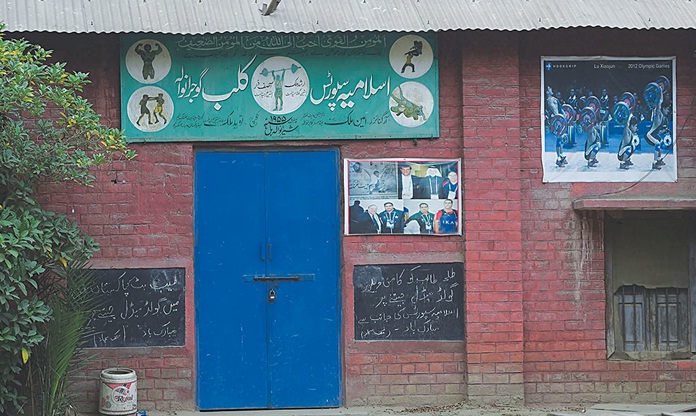
Entrance of a gym in Gujranwala | M Arif, White Star
Gujju had just passed his primary school when a neighbour took him to a local gym. He never took interest in his studies after that visit, his family recalls. He could go only as far as grade nine and that, too, after a lot of coercion by his parents.
After quitting school, he started going regularly to a gym near his home, spending a lot of time there every day, members of his family say. He started training as a bodybuilder under the supervision of one Yousaf Pehalwan who taught him heavy workouts and how to gain enormous muscles.
Gujju was only 16 when he set up his own gym — a humble facility on a piece of land owned by his family. Initially, he equipped it with such basic gear as dumb-bells. The gym’s main function was to provide its proprietor a place where he could focus on his own training — and earn his livelihood on the side.
It did not take long for Gujju to win his first competition. He became Mr Sialkot in 1998, only a couple of years after he opened his gym. He was the youngest winner in the history of that competition.
It was not a walkover. His competitors were all well prepared. Bodybuilding, indeed, is a craze among youngsters in Sialkot district and the area is known for producing world-class competitors in the sport.
Gujju went on to compete wherever and whenever he could but it took him seven more years to win his next title — he became Mr Division Gujranwala in 2005. The competition is known to involve some of the best bodybuilders in Punjab and has contestants from the districts of Sialkot, Gujranwala, Gujrat, Narowal, Hafizabad and Mandi Bahauddin. The first two of these districts are considered to be the hub of bodybuilding and traditional wrestling in Punjab.
“It was a matter of great pride for our family and our neighbourhood,” says Rizwan of his brother’s victory.
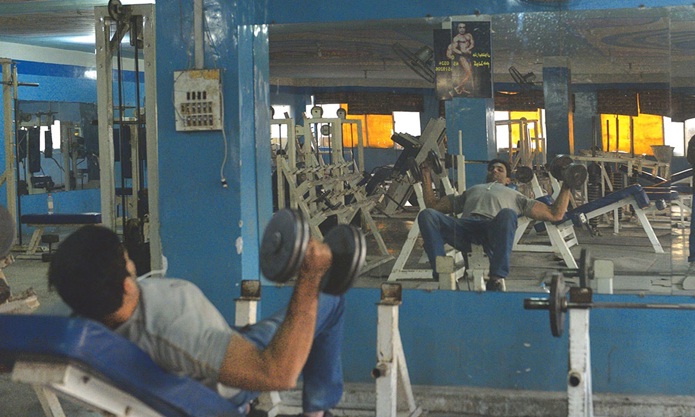
M Arif, White Star
Two years later, Gujju secured the highest title of his career — he became Mr Punjab, beating competitors from all over the province. “He was ecstatic that day,” Rizwan reminisces. “He had that ‘told-you-so’ look about him when he came home with the trophy.”
Gujju competed multiple times for the title of Mr Pakistan and that of Mr South Asia but managed to secure only runner-up positions. He lost some of these competitions by a very thin margin, says his brother.
Gujju’s death left his family, neighbours and most of Rangpura in shock. A large number of people – including around 28 winners of the Mr Pakistan title – showed up at his funeral. Everyone was in tears and no one could believe that someone as fit and stout as Gujju could die all of a sudden.
World Gym remained shut for days after Gujju’s death. It took several days for his brother as well as his partners and protégés to bring people back — such was the distress and horror of its regular patrons.
Muhammad Arif – a sharp-looking young man who sports a ring in one of his ears – was one of Gujju’s main acolytes. He has not worked under any other bodybuilder since he started receiving training from Gujju many years ago. It took Arif’s mentor only a few months to recognise his talent. Gujju soon offered the trainee to become the trainer at his gym. (Such learning-by-doing under champion bodybuilders is crucial for acquiring credentials to train others in the art of bulding the perfect body.)
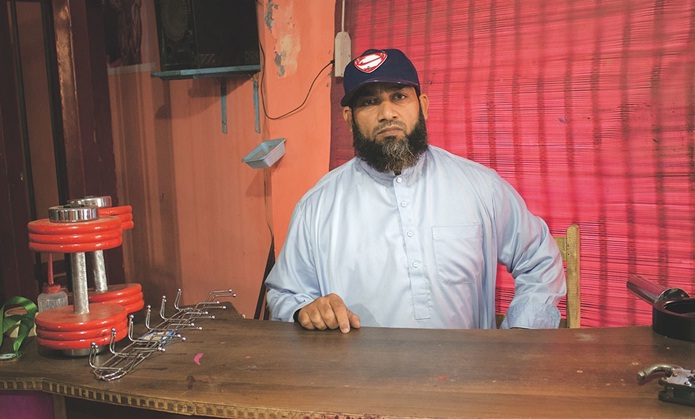
The formula for success in the sport is based as much on physical training and workout as it is dependent on maintaining a special dietary regime. Gujju’s own daily food intake was gargantuan.
His breakfast included a good amount of mutton, whites from a dozen boiled eggs, brown bread and a glass of fresh pomegranate juice. For lunch, Gujju would have one kilogramme of minced beef (keema), boiled rice and salad. For dinner, he regularly consumed four chicken leg pieces, roasted without salt and spices. “He started taking this diet in 1995 and kept at it until his very end,” says Muhammad Shahbaz, a thickset man in his early forties with a heavy beard, who part-owns Gujju’s gym.
The food cost many hundred rupees every day — a price borne by Gujju himself and his family. (Some bodybuilders are lucky to find rich patrons to finance their diet.)
Gujju also quit oily foods. At least six months before a competition, he would stop eating fried food to keep the flab on his body to the minimum. He would also take medicine to gain weight, increase muscle mass and whet his appetite in order to add to his calorie intake.
Most media reporters in Sialkot attribute Gujju’s death to the use of these drugs. Rizwan denies knowing if his brother was consuming any prohibited and harmful medicine. “I never saw him taking any drug. Never.”
Shahbaz and Arif also claim that Gujju’s training regime never included the intake of any banned substance. “I always found him opposing the use of steroids; he never recommended them to any of his trainees,” says Shahbaz.
But he did take protein supplements, acknowledges one of them. His trainer, one Shaukat Ali from Lahore, would prescribe what supplements Gujju needed to take and in what quantity.
Shaukat Ali is neither a nutritionist nor a specialist of sports medicine. Gujju took whatever food supplement the trainer recommended without ever consulting a doctor, says Shahbaz. He fully trusted Shaukat because of his vast experience in training bodybuilders.
Even if Gujju was consuming only food supplements, he had used them for almost 25 years. Along with mountains of food that he ate every day, these supplements would have had an impact on his body that Gujju either did not know or did not anticipate. “His life was anything but normal,” acknowledges Shahbaz.
Gujju’s mother was always wary of the impact her son’s food and drug intake could have. “She was opposed to Gujju taking supplements and maintaining a heavy diet regime,” says Rizwan.
It was the third day of Eidul Fitr this year — a lazy summer day in the first week of July, made lazier by the hectic festivities of the two preceding days. Irfan Butt, a handsome man in his mid-forties with age-defying features, spent the whole of that afternoon and some part of the evening at his in-laws, along with his wife and daughter who live in Norway and had come to visit Pakistan only a few days earlier. The three came back home – in Bakhtewala neighbourhood of Gujranwala – at around 8pm.
Known for being a big eater, Butt immediately demanded food upon returning home. He ate heartily and lay down on a sofa in his room, chatting with his nephews.
“He had applied for a Norwegian visa. His nephews were asking him for a treat in anticipation of the visa’s approval,” says Butt’s younger brother, Muhammad Ali. He remembers peeking through the door and smiling at the people inside.
Butt was in the middle of the chatter when he felt he was having trouble breathing. Just as he was telling his wife about it, he fell to the ground, gasping for breath. Muhammad came rushing to help. “I checked his heartbeat and found that his heart had stopped beating — like someone had pulled the plug on him,” 33-year-old Muhammad recalls.
Butt’s family took him to a government hospital only to discover that he was dead already. “I was numb with shock. It was unbelievable,” says Muhammad.
Butt had fractured his legs at a very young age in an accident and was unable to walk for several years. During this time, he learned sewing and embroidery and became a successful businessman, exporting most of his products to countries as far away as Germany, Norway and England. For the last many years, he had also taken to working out regularly at a local gym.
Too much testosterone can lead to acne, premature balding, development of breasts (in men), impotence, heart disease and liver failure.
Reporters in Gujranwala treated his death as another case of a bodybuilder dying of the excessive intake of banned substances such as steroids. The Pakistan Bodybuilding Federation, too, agreed with them. Reporting his death as part of a series of similar incidents, the federation said in its letter to the Pakistan Olympic Association that Butt was receiving training to take part in a bodybuilding competition from one Malik Faiz Rasool who, according to the letter writer, was “encouraging the bodybuilders to take drugs”.
Rasool is one of the most sought-after trainers in Gujranwala and has trained many known bodybuilders such as Ali Ashraf, a recent winner of the Mr Gujranwala title. Butt’s family, however, claims that he was not taking part in any bodybuilding competition and that he worked out only to maintain his fitness.
Butt was well respected in his own neighbourhood. From the owner of a cold-drink shop to a vegetable-seller in Bakhtewala, everyone praises him for being kind, humble and religious. The vendor of a breakfast eatery on the ground floor of Butt’s house remembers seeing him the day he died. “He came down wearing new clothes and asked me if he was looking good,” recalls the vendor. “The news dropped on me like a bomb. I cannot forget how handsome he looked on the day of his death, ” he says.
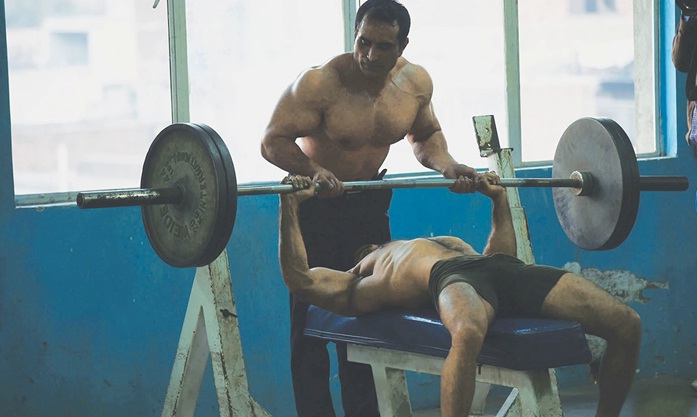
M Arif, White Star
Matloob Haider was a 22-year-old bodybuilder from Rahwali, a small town located a few kilometres north of Gujranwala city. He died in April this year in circumstances uncannily similar to those under which Gujju and Butt had died.
He was reportedly preparing for his first competition and spent most of his time in a gym near his house. One day he came home, had dinner and was chatting with his mother when he started having problems in breathing, members of his family say. He collapsed and died while he was being rushed to the hospital.
There were rumours that he had taken a strong dose of steroids to win the competition, scheduled to take place only two days after he died. His family denies any knowledge of his drug intake. Health officials in Pakistan do not perform mandatory autopsies in cases like these, in order to ascertain the cause of death. Families of the deceased resist the autopsies in any case.
The police also do not maintain a record of deaths other than those resulting from crimes or accidents. Neither do government hospitals. The only source for statistics is the local media — which reported that at least four bodybuilders died in Sialkot and Gujranwala in April 2016 alone.
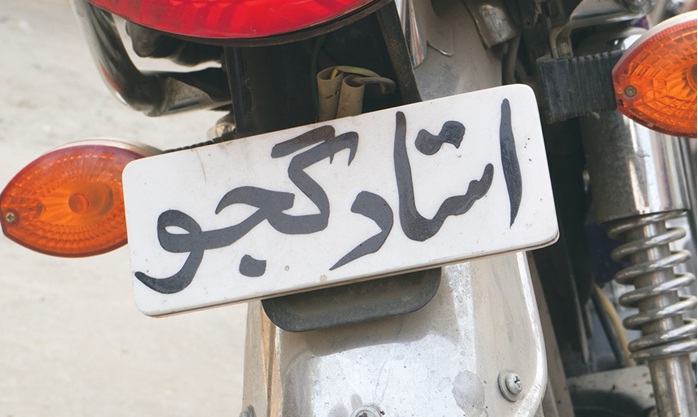
The Pakistan Bodybuilding Federation put the number of bodybuilders having suddenly died in the first four months of this year at five — one each in Sialkot and Lahore and three in Gujranwala. Pervaiz, general secretary of the federation, accuses one Sheikh Farooq Iqbal from Lahore of running an illegal bodybuilding network. Iqbal, according to Pervaiz, enables and, at times, encourages the use of steroids. (Iqbal could not be contacted despite several attempts.)
Hafeez Bhatti, a director at the Punjab Sports Board, acknowledges that “steroids are used very commonly in bodybuilding” in different parts of Punjab. The board, he says, has instructed various bodybuilding associations under its jurisdiction to investigate the reasons behind the recent deaths of bodybuilders. “We have also asked for their recommendations to keep bodybuilders away from the use of steroids.”
Bhatti says there are no Punjab-specific rules that his department can implement to rid the sport of banned substances and harmful food supplements but he insists that “no association or federation is allowed to encourage bodybuilders to use steroids in any case”.
Ali Ashraf, 33, is one of the emerging bodybuilders in Gujranwala. He first joined a gym in 2008 for fitness training and does not remember what exactly motivated him to start the heavy workout meant only for bodybuilders. He, however, remembers meeting some of the big names in the bodybuilding circuit while training with Malik Faiz Rasool.
Sitting in his drawing room in the neighbourhood of Faisal Colony, Ashraf tells his story. “It was very encouraging to see my body respond very positively to the workout. I could see my biceps and triceps growing. This motivated me to strive for more.”
Ashraf started preparing for his first competition in 2012. A year later, he won the title of Mr Gujranwala. He then started preparing for the Mr Punjab contest and is now training to become Mr Pakistan — a competition in which the most eminent bodybuilders from across the country take part. (Ashraf estimates that the cost of preparation for each competition is around 400,000 rupees — an expense that he pays from his own pocket. So do most other bodybuilders, if they cannot find sponsors.)
Trainers also make aspiring bodybuilders exercise more than their bodies can handle.
He takes many supplements in addition to his protein-rich regular diet. His daily supplement dose consists of two spoons of Nitro Tech protein, one spoon of Cell Tech power supplement, one tablet of Vitamin C, three tablets of Vitamin E and a dose of Mega Sports Supplement. He uses these potions and pills before every workout.
Some of the most popular supplements used by bodybuilders are whey protein (which improves muscle mass), branched-chain amino acids (which mend injured muscles quickly), creatine (that increases the weight and size of the body) and omega fish oil (which improves the circulation of nutrients and vitamins in the body, strengthens bones and increases the body’s energy level).
Ashraf believes his trainer – who has been in the business for more than 25 years – is experienced enough to prescribe the right supplements with the right doses to him. The trainer usually prescribes supplements based on the number of years a bodybuilder has been working out, as well as his age, height and weight.
Ashraf also admits to have taken steroids before participating in a competition some time ago — because of the possibilities they offer. “It is a shortcut,” he says. “What you are able to achieve in six months on a regular diet, you can achieve in 15 days with steroids.”
A gym instructor helps his trainee exercise in Gujranwala
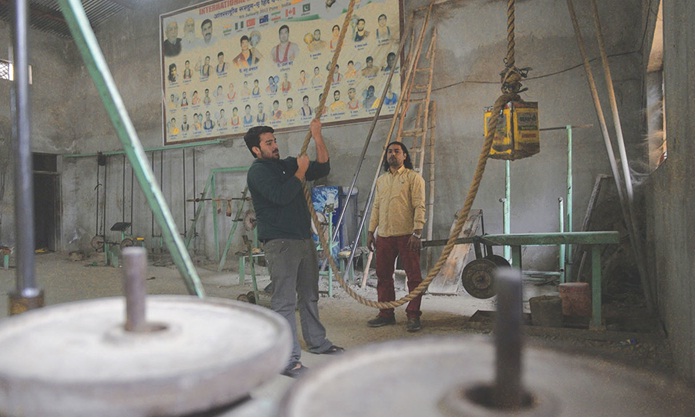
A gym instructor helps his trainee exercise in Gujranwala
The sale of food supplements and steroids is a booming business in Gujranwala. From medical stores to shops specialising in their trade, these can be found quite easily in many parts of the city — and without requiring a prescription from a certified physician.
Hafiz Shoaib works at a chain of specialty stores, with outlets in many cities in central Punjab, that sell many food supplements. With a branch on GT Road in Gujranwala, the firm imports the supplements from many countries in the West.
Shoaib does not have the academic qualification to work at a place dealing with drugs but he claims that his employer is a government-registered company. A wooden counter behind his seat is adorned with a number of framed documents that look like certificates but he does not allow a closer look at them. He says the owners of the company have forbidden him from granting that permission.
Shoaib also feigns ignorance about the medical harm the supplements can cause. “What will happen if you take an excessive amount of food? You may get an upset stomach. That is also the maximum that may happen if you use supplements,” he says rather nonchalantly.
Expert opinion is diametrically opposed to his why-should-it-matter point of view.
Dr Saleh Muhammad, a senior doctor working at Sialkot Medical Complex, believes food supplements can cause higher than normal heart rate, increased blood pressure, create kidney and liver problems and, at times, lead to irritability and sleeplessness. “The use of supplements may become a major, if not the only, cause of a heart attack.”
Yasser Ul Haq is a strong voice against the use of steroids in bodybuilding. He holds a masters degree in exercise physiology and has competed as a bodybuilder, weightlifter and powerlifter in the United States.
In an email exchange from Islamabad, where he is based these days, he explains what a steroid is before explaining its impacts on the human body: Steroids are organic compounds that have two main biological functions; firstly, they work as important components of cell membranes, allowing cells to change shape (be fluid or rigid) and allowing them to move around; secondly, steroids act as signals for molecules to grow.
Three of the most well-known steroids found in the human body are cholesterol, testosterone and progesterone. Cholesterol, Haq explains, is an essential structural component of all animal cell membranes. “It plays an essential role in maintaining a membrane’s fluidity.”
Testosterone is primarily a male sex hormone. It is known to play a key role in the development of male reproductive tissues and in promoting secondary sexual characteristics such as increased muscle and bone mass and the growth of body hair. It is secreted primarily by the testis and, to a lesser extent, by the ovaries.
All athletes – bodybuilders, powerlifters and even tennis players, as well as average gym-goers – know about the advantages of injecting or ingesting testosterone (or other steroids), says Haq. “Unfortunately, most of them have no clue which steroid to take, how much to take, when to take and for how long.”
Too much testosterone, for instance, can lead to acne, premature balding, development of breasts (in men), impotence, heart disease and liver failure, Haq says. “It may also cause aggression, rage and violent behaviour.”
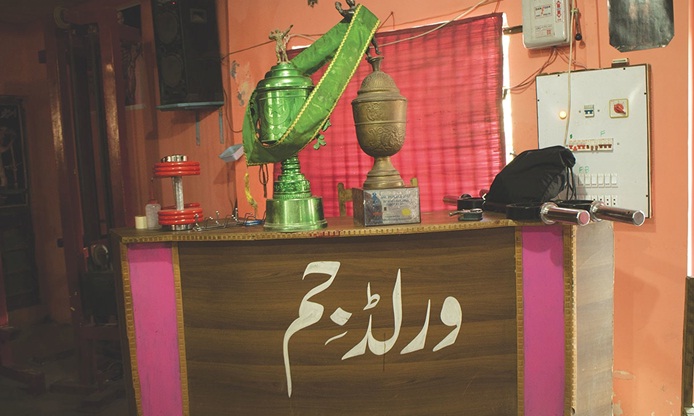
Ustad Gujju's trophies on display at World Gym | Umer Ali
Hafiz Shoaib thinks and acts like a salesman — that, too, of goods that require their sellers and buyers to observe no precautions. He does not understand why anyone requiring food supplements should need a prescription for purchasing them. “Do you need a prescription before buying food?” he asks, as he attends to a customer who asks for a supplement that tastes good.
Drug inspectors from the health department frequently visit the outlet Shoaib works at. He insists they have never raised any objections about over-the-counter sale of the supplements. Four medical stores in Gujranwala’s Sarafa Bazaar are also known for selling food supplements and anabolic steroids the same way — without asking for prescriptions. Their names – all, in fact, variations of the same name – surface in almost every interview with local young men aspiring to be bodybuilders.
Rana Moazzam owns one of the stores. In his early forties, he sports glasses a size too big for his face. Sitting on a counter right beside his store’s main door, he does not see anything wrong in the way he is doing business. “The supplements we sell are not harmful. They are being sold everywhere. We do not sell anything illegal here.”
He says government officials have checked his store multiple times and they have found no anomalies in its operations. “We have been inspected by three drug inspectors as well as by the [executive district officer] EDO health himself.”
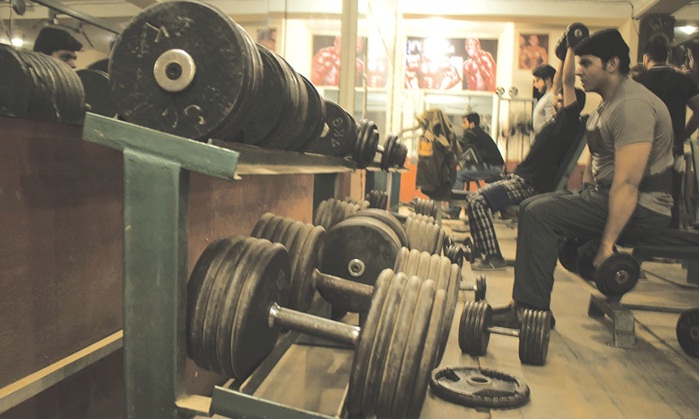
He, indeed, has a licence, issued by the Punjab Pharmacy Council, allowing him to operate as a pharmacist. The licence is in the name of one Faisal Habib who has a degree in pharmacy from the University of Balochistan. It declares that Habib is fit to run a pharmacy, but he is nowhere to be found in the shop. Moazzam says Habib does not visit the shop unless there is an inspection.
Dr Saleh Muhammad says absentee pharmacists are a usual phenomenon across Punjab and are an integral part of how the licence system works. “The shop’s actual owners pay a pharmacy graduate a certain amount of money on a monthly basis to get a licence from the government in his name,” he says. “The pharmacist never needs to be at the outlet,” says Muhammad, who is also a member of the district drug quality control board set up by the executive district officer (EDO) health in Sialkot. “How can a licence system be effective if it is being grossly misused like this?” he asks.
Moazzam sells such steroidal injections as Abolon, which is used for muscle growth. He also displays boxes of Testoviron Depot, another anabolic steroid containing testosterone. It stimulates the growth of muscles and increases their strength.
Both the World Anti-Doping Agency (Wada) and the US Anti-Doping Agency (USADA), according to Drugs.com, an independent medicine information website, have banned the use of these steroids in sports. These “agents are prohibited at all times, both in- and out-of-competition in collegiate and professional sports,” reads an entry on the website.
The most significant side effects of these agents, according to the drug encyclopedia, include severe acne, liver diseases like tumours and cysts, kidney failure, heart attack and stroke, high blood pressure, shrinking of testicles and infertility.
Heavy workout and regular intake of food supplements started having negative effects on his body in “several ways”.
A bodybuilder in Gujranwala, who has taken part in 12 competitions, confesses to have used Testoviron Depot and as a result, losing his ability to father a child. “The use of steroids has rendered me infertile,” he says. But he is preparing for another contest and is again using the same steroid. “There is no other way,” he says in a resigned way.
Moazzam claims his medical store never sells steroids without a valid prescription written by a qualified doctor. “We maintain a record of who is given what medicine and in what amount,” he claims, though he fails to produce that record when asked about it.
Saeed Ullah Khan is the highest government officer in Gujranwala district to monitor the sale of drugs and food supplements. Working as EDO health, he at least understands the problem: “Not a single bodybuilder would visit a dietician for a prescription. Instead, he would go to his trainer who is not qualified to prescribe such sensitive drugs.”
Saeed Ullah says his department is doing all it can to curb the sale and use of steroids but he insists these tasks cannot be accomplished without raising the level of public awareness about their harmful effects. As long as there is demand for these drugs, “we may close 10 stores today but 10 more will sprout up tomorrow”.
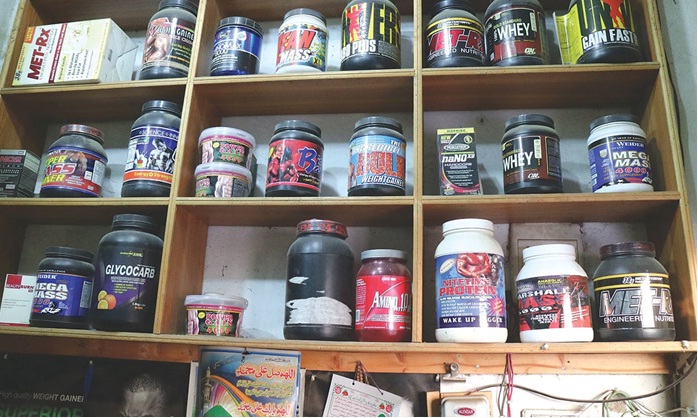
Supplements on display at Ibrahim Khan's shop | Umer Ali
Streets are dusty narrow lanes and houses are humble brick-and-mortar structures in Bhagwanpura, a working-class neighbourhood near Gujranwala’s wholesale market for vegetables and fruits. Ibrahim Khan sells food supplements here.
His shop, a hole in the wall that displays its wares in a glass showcase placed right inside the entrance, is a favourite haunt for bodybuilders in Gujranwala and its neighbouring districts.
Khan was once a major contender in bodybuilding competitions, having taken part in around 43 major and minor ones and securing leading positions in at least 28 of them. He is also a highly-respected bodybuilding trainer in the area.
He started preparing for his first competition in 2001, when he was working as a private guard for a pittance. His diet during the preparations would cost more than 2,000 rupees a day — way above and beyond what he could earn in a week.
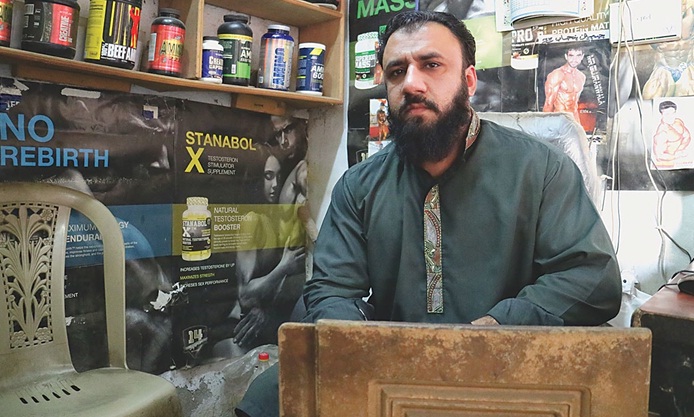
“My trainers and some of my friends saw potential in me and paid for my diet. I would not have been able to afford such an expensive diet on my own,” he says.
As soon as Khan started getting recognition at the gym, he decided to leave his job. “What good could the meagre salary of a guard be when you were being sponsored by some of the most powerful people in Gujranwala?” (What the sponsors get in return remains unclear, though rumours of betting heavily cloud the bodybuilding circuit.)
Bodybuilding changed Khan’s life. If he had not left his job to become a bodybuilder, he “would still be earning not more than 10,000 per month”. (It is unclear how bodybuilders make money. Monetary rewards for winning competitions are negligible and there is no government system to give stipends and scholarships to talented or recognised bodybuilders. They may charge some fee for appearing in exhibition matches and festive events.)
The change in Khan’s life also had a downside. Heavy workout and regular intake of food supplements started having negative effects on his body in “several ways”. Eventually, he was unable to continue as a bodybuilder. He was so distraught after he found out about changes in his body that now he feels relieved at not having to subject himself to the strains of bodybuilding. “I am glad that I have left the field.”
Khan blames gym trainers for the ills of the sport. Often only semi-literate and with no scientific understanding of biology and chemistry, they recommend diets that surpass the capacity of a bodybuilder’s body to absorb, he says. Bodybuilders also try to increase their appetite artificially to comply with their trainers’ dietary instructions. This later creates medical complications.
He recalls how he once ate 100 puris to prove how he had developed an extraordinary capacity to ingest food. “But my stomach was never the same afterwards,” he says.
Trainers also make aspiring bodybuilders exercise more than their bodies can handle. Bodybuilders sometimes lose as much as 30 per cent of their energy during such workouts, Khan says, and they need to recover the loss immediately in order to maintain their weight and muscle strength.
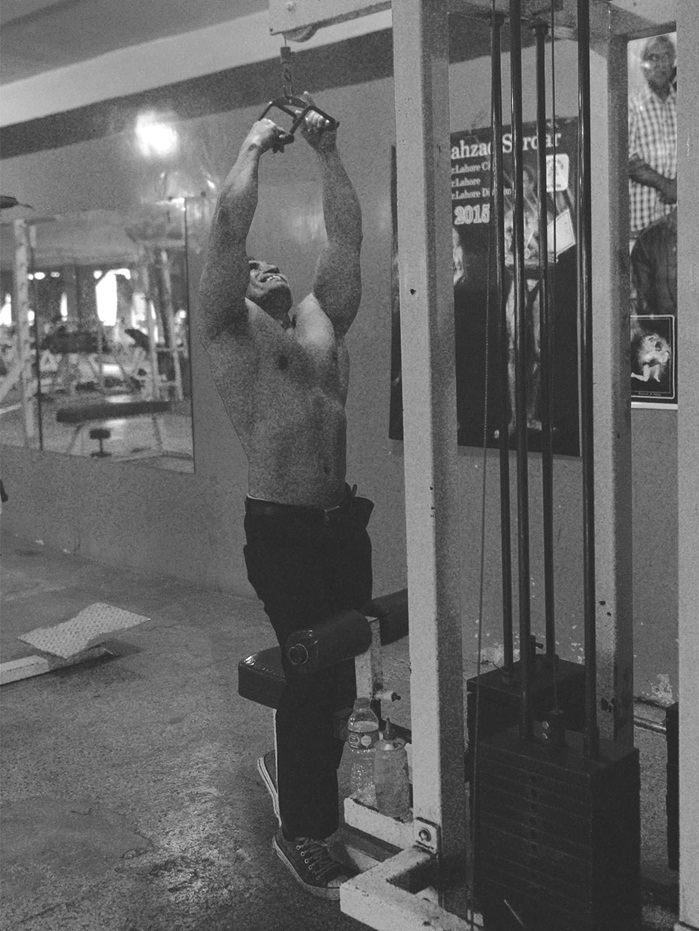
When their bodies fail to recoup the lost energy through natural means, they take food supplements — mostly proteins, vitamins and minerals. Others take drugs meant for increasing sexual prowess in order to maintain high levels of energy during workout routines. These drugs help them achieve their short-term objectives but increase their blood pressure which can have dangerous, even fatal, consequences.
Sometimes they take steroids for an even quicker fix, says Khan. “Steroids may help you build strong muscles in the short run but your body will undergo an unimaginably painful change in the long run.” Khan suggests that the government open laboratories in cities such as Gujranwala and Lahore to test the diet and food supplements being taken by bodybuilders. “The trainers should also require certification before they start working at gyms.”
He also suggests that parents keep a strict check on their children — to ensure that they are being trained by certified trainers and that their diet and other supplementary intakes meet health standards.
“The best the parents and the government can do is to remain vigilant,” he says. “You cannot root out bodybuilding.”
In a bodybuilding competition, a contestant is required to pose in front of judges who rate him according to the size, mass and strength of his muscles. A bodybuilder must perform seven compulsory poses – front double biceps, front lat spread, side chest, back double biceps, back lat spread, side triceps, and abs and thighs – to show how big, numerous and flab-free his muscles are.
In our part of the world, bodybuilding has taken the strongest roots in a triangle of cities – Gujranwala, Sialkot and Lahore – all of which have a long-standing tradition of wrestling clubs known as akhaaras. Gujranwala, in fact, is called the ‘city of wrestlers’.
Dr Ishtiaq Ahmed, a Sweden-based Pakistani social scientist and historian who has written about the partition of Punjab in his 2011 book The Punjab Bloodied, Partitioned, and Cleansed, traces the origin of bodybuilding to ancient Greece. Wrestling was one of the most common sports in the Greece of pre-Christian millennium, he says in an email conversation. “Strong men have always been admired by their peers and even women are attracted to them … This is the Greek ideal,” he says and then mentions the gladiators of the Roman Empire — an inheritor of Greek cultural and political influences. “Perhaps the Greeks brought the sport to the subcontinent,” says Ahmed. “But I would imagine there must have been similar practices locally as well.”
Ali Usman Qasmi, who teaches history at the Lahore University of Management Sciences, says in an email communication that wrestling and its variants become sites of exhibiting masculinity where degrees and qualities of manhood are compared and contested in physical terms.
The superiority or inferiority of these qualities sometimes lends itself “to be appropriated” by political and religious contexts, he argues. During Partition, thus, wrestling became an arena to display the relative strengths and weaknesses of the Hindu and Muslim communities of Punjab. A wrestler became the bodily representation of the strength of a nation or a community, says Qasmi.
Such physical sports are also amenable to geographical appropriation as well — the wrestlers of Gujranwala being considered better than those from elsewhere, for instance. “General ideas about physical strength, or its acquisition and retention, are widely shared, circulated and believed to be true,” Qasmi says of the widespread popularity of sports such as bodybuilding.
That is still a partial explanation.
It is 9:15pm. Dozens of motorcycles are parked outside a shopping mall in Gujranwala’s upper-middle-class neighbourhood of People’s Colony. The area is full of fast food joints. It seems that the owners of the parked motorcycles have come here to have food. But they have not. They are, in fact, working out at a gym located on the first floor of the mall, right above a restaurant.
A Bollywood beat booms out in the staircase leading to the gym. It is the catchy Blue Eyes, a hip-hop song by Indian rapper Honey Singh. The gym is a floor of shops converted into a hall where the latest exercise gadgets gleam in artificial lights. With the music’s volume turned up, the place appears more like a dance club than a physical fitness centre — except that people here are working out obsessively. Muhammad Kashif has just arrived at the gym. He is looking at a big television screen where Indian film actor Salman Khan is dancing to the tune of 2016 chartbuster song Baby ko base pasand hai. In his early twenties, Kashif joined the gym in 2012 after Salman Khan’s film Dabangg was released.
After warming up on a treadmill for a while, he starts working out strenuously — using dumb-bells, with progressively increasing weights. He then trains his biceps and triceps. And as he does all this, he seems to be lost in a world of Bollywood dreams in which barrel-chested heroes with no shirts chase size-zero heroines on a pristine beach jutting out of an azure sea.
“I never really liked Salman Khan until Dabangg was released,” Kashif later says. “He grew such huge muscles [for that movie] and looked really cool.”
The actor and the movie, indeed, are almost everyone’s favourites around the gym. In the movie, Salman Khan plays Chulbul Pandey, a policeman who is not just witty and brave but also has good looks and a muscular body.
Dabangg – and its 2012 sequel Dabangg 2 – became an instant rage in Gujranwala when it was released. Since then, local gym owners have seen a significant rise in their clientele.
The proprietor of the People’s Colony gym, who does not want to be mentioned by name, confirms that. “Many of the trainees come here with the sole purpose of looking like Salman Khan. Their haircuts and facial hair are all in the fashion of Chulbul Pandey.”
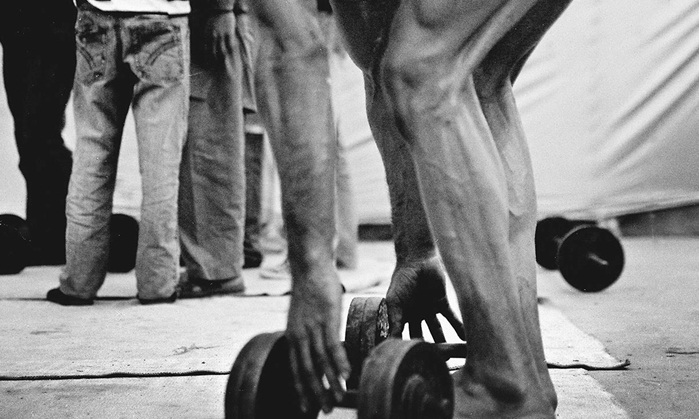
One of them is a student of Punjab College, a private educational institution. He is sporting a trimmed mustache and a crop-cut hairstyle à la Salman Khan in Dabangg. “Look, how Sallu bhai dances, how he romances and what a wonderful body he has,” says the student, calling the actor by his nickname. “A hero has to be like him.”
A 22-year-old Punjab University student has found inspiration thousands of miles away, in Hollywood action hero Arnold Schwarzenegger. “I grew up watching his movies,” he says, seeking to keep his identity secret.
Schwarzenegger is a quintessential macho – much heavier, stouter and tougher than even Salman Khan – and a former multiple time Mr World to boot.
Most teenage boys and young men look at the Hercules-like physiques of such action heroes and professional bodybuilders and they want to be like them, says Haq. “In their greed to achieve results instantly, they go for excessive use of steroids.”
Music is another stimulant. When it changes from Blue Eyes to Champion – a song celebrating the victory of the West Indian cricket team in an international championship – the floor of the gym starts to shake to its rhythm and the level of energy among the trainees suddenly reaches its peak. “Music pumps me to work even harder,” says Zubair Shabbir, a 28-year-old local shopkeeper. “It stirs the frenzy inside me.”
More than anything else, bodybuilders are motivated to continue working on their bodies by their own success in this endeavour: the more muscular you get, the harder you train to become even more muscular, says Shabbir. “When I see myself in the mirror and look at the muscles that look big while also being stiff, it motivates me even more to continue doing so.”
No price seems so steep as to hamper this ceaseless desire to beat – and best – oneself.
Source :
herald.dawn.com, Jan 03, 2017
Send email to nazeerkahut@punjabics.com with questions, comment or suggestions
Punjabics is a literary, non-profit and non-Political, non-affiliated organization
Punjabics.com @ Copyright 2008 - 2018 Punjabics.Com All Rights Reserved
Website Design & SEO by Webpagetime.com














